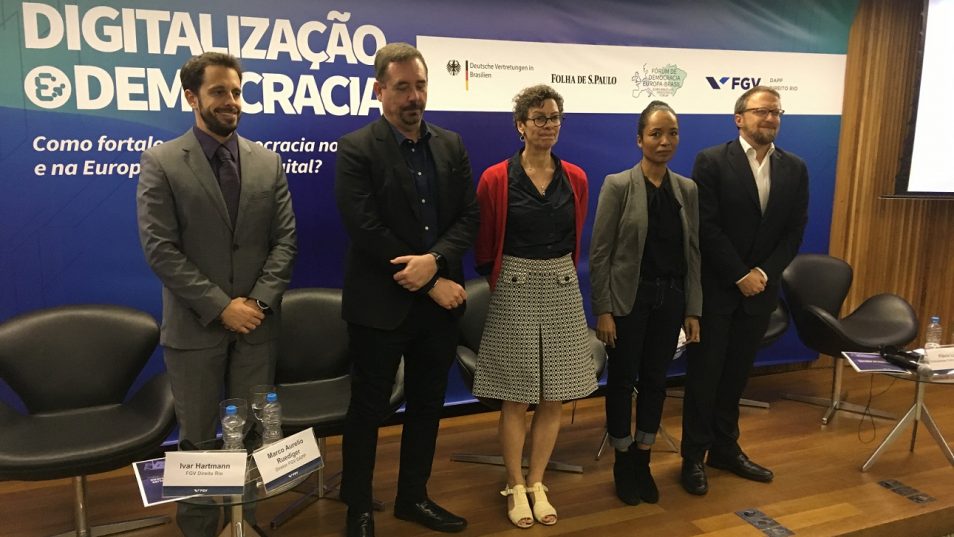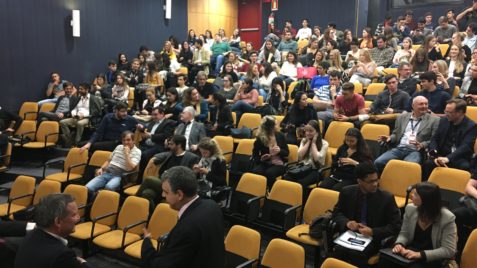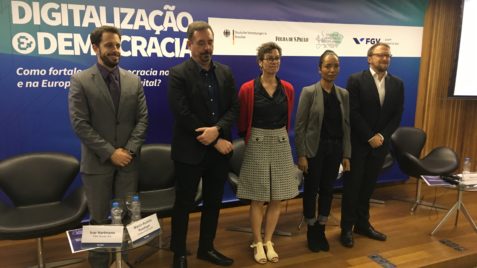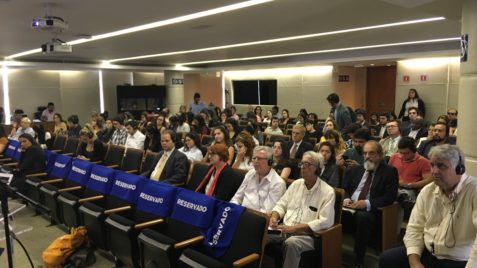The reflections on digitalization do not control democracy
 © Deutsche Botschaft Brasilia
© Deutsche Botschaft Brasilia
Democracy has been experiencing transformations and is shaping itself in new times, thus holding a key position in the discussion and reflection agenda in many countries. When the subject is the relationship between digitalization and democracy, many people call the tools of the digital era, especially the social media, active agents and influencers of democracy these days. Contrary to this theory, Jeanette Hofmann, a Professor at the Free University of Berlin (FU Berlin) and Director of the Alexander von Humboldt Foundation (AvH) for Internet and Society, believes that the social media does not dictate that control.
Under the topic “Digitalisation and Democracy: How to Strengthen Democracy in Brazil and Europe for the Digital Age?”, Hofmann took part in the May edition of the Europe-Brazil Democracy Forum, organized by the Embassy of the Federal Republic of Germany in Brasília. During an interview to the DWIH São Paulo, she spoke about the main dilemmas of this issue.

- What is the relationship between digitalization and democracy?
We are observing a fundamental change in democracy. Particularly, the institutions of representative democracy are in a critical situation: elections lose their previously central roles, political parties lose their regular voters, and, worldwide, institutions are losing the trust of their citizens. But the internet and the digital media are not the ones responsible for this transformation process. The change of democracy began well before the triumphant march of the digital media.
- So, we can say that digitalization influences democracy? But how can we deal better with this?
Exactly: digitalization, in itself, cannot influence anything. The question is how and for what purpose do people use the digital media. What stands out is the fact that people use the social media to experiment with new ways of participating in politics. Above all, the younger generation exploits the new media, in order to coordinate and call for their political complaints to be heard. But we also see that those on the right use the social media with great creativity. One example of this we saw in the political actions performed by WhatsApp groups during the electoral campaign in Brazil. Not all forms of using it can be evaluated as positive. Problems arise when political communication abandons the public sphere and individual political demonstrations can no longer be criticized, due to their obscurity.
- Democracy and digitalization are important subjects not only in Brazilian and European politics, but also throughout the world. Why?
One dramatic innovation is the fact that citizens have their own voice, thus being able to express their frustration regarding government policies and actions. At the same time, the mass media is losing their role as agenda setter and gate keeper, which used to determine how we should interpret the world and evaluate the government’s political stance. The pluralization of the people pushed forward a dynamic that made politics less predictable and controllable. The effects are perceived worldwide.

- How can democracy be strengthened in the digital era?
In the first place, by engaging the younger generation in the political debate, but also by fomenting public reflection on how representative democracy can develop in an era when elections are only one means of participating in the political process.
- What is the role of the press for the development of populist politics?
I am under the impression that the parties and populist movements grew exactly through the involuntary collaboration of the press. It is a very simple mechanism: a politician makes a provocative statement, offending the established norms. The press, which acts on the click bait principle, in pursuit of receiving the greatest amount of attention possible, transforms the provocation into a headline, thus fomenting the fame and normalization of populist politicians. The press itself should work against this mechanism, establishing a code of conduct that condemns this type of public expression.
- You took part in the event “Digitalisation and Democracy: How to Strengthen Democracy in Brazil and Europe for the Digital Age?”. Why has this subject become so important today?
My scientific message is that we must not hold the social media accountable for the problems of democracy. Most of the big challenges faced by representative democracy are not connected with the social media. The public discussion of expressions of hate and fake news suggests that those phenomena did not exist before. It also shows that we must confront those phenomena from legal bases, in court, so as to reduce the attempts at political manipulation. In my opinion, these two considerations are unfounded. Rather, it is time for us to defend the right of citizens to freely manifest themselves and to remember that the publication of untruths is not prohibited. The right to free speech protects that freedom for good reason. No one, much less a government authority, should have the power to decide, in our name, what is right and what is wrong.

At the end of the interview, we asked Professor Hofmann to give a short response regarding several words and phrases.
- Digitalization: An open process, not having its own logic, which is daily influenced by us as a society.
- Democracy: A currently fragile and unstable, but yet the best form of government, which needs to be concerned about its legitimacy.
- Democracy and politics: A constellation that we should observe within an historical context.
- The ideal world of a democracy in the digital universe: All people are benefited by the removal of obstacles regarding information and participation. Furthermore, many people experiment with new forms of political participation, thus increasing their level of knowledge.
- Big Data, Scoring: The digital media provides us with new resources for social and political coordination. Scoring is a big data technology that will change our self-knowledge, that is, our view of ourselves.
- Fake News: This phrase suggests more clarity than it actually offers. There is no precise definition. For that reason, we should not attempt to regulate fake news.
- Society in this context: In many countries, society is going through a process of disintegration. The media is not the reason for the disintegration, but rather the effect. The way in which we use the media reveals a lot regarding the situation of modern society.
by Ana Paula Katz Calegari
